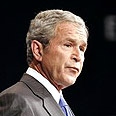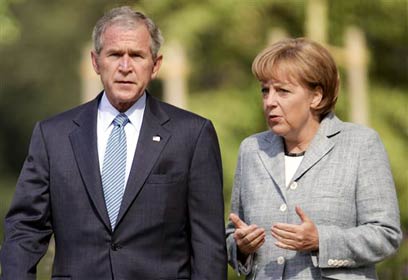
Bush on Iran: All options are viable
US president meets German chancellor in Berlin to discuss Iranian threat, global warming, war in Afghanistan. Both leaders want to stop Iran's nuclear program, but while US is pushing for conclusive action, EU wishes to exhaust diplomatic avenue first
President George W. Bush said on Wednesday he wants to solve the Iran issue peacefully but reiterated that "all options are on the table".
"The first choice is to solve it diplomatically and that's exactly what we're doing. The message to the Iranian government is very clear," Bush said at a joint news conference with German Chancellor Angela Merkel in Meseberg, Germany.
Bush and Merkel both want to keep Iran from developing nuclear weapons but they're standing on opposite sides of a revolving door: Bush's desire to resolve the nuclear standoff with Tehran before his presidency ends was the highlight of his talks with Merkel.
Bush was urging Merkel and other European leaders to show solidarity against Iran in the form of tougher sanctions if the country doesn't stop its uranium enrichment program.
Global warming, Afghanistan and relations with Russia also were expected topics at Bush's meeting with Merkel.
On Iran, Europeans want to wait on stiffer sanctions until after the European Union's foreign policy chief, Javier Solana, visits Tehran to present a package of incentives in exchange for stopping its enrichment program. The offer, an updated version of one that Iran ignored a few years ago, was developed by the United States, along with Germany, Britain, France, Russia and China.

Opposite sides? Bush and Merkel (Photo: AP)
US pushing for new sanctions
Following Bush's final US-EU summit Tuesday in Kranj, Slovenia, the leaders issued a joint declaration that said the United States and Europe "are ready to supplement those (previous) sanctions with additional measures" if Iran does not halt enrichment. It also said they would "work together ... to take steps to ensure Iranian banks cannot abuse the international banking system to support proliferation and terrorism."
It was unclear whether this second pledge meant Europeans had signed on for the kind of harsh measures the US favors, such as prohibiting business with Iranian banks, or merely represented a repeat of previous calls for closer monitoring of dealings with them.
Bush's campaign for stronger sanctions has been bolstered by the International Atomic Energy Agency.
Europe prefers diplomacy
Iran claims its nuclear program is geared toward generating electricity not bombs and remains defiant, saying the evidence from the US and other purportedly backing the allegations was fabricated.
Agreeing to stiffer sanctions, such as taking further steps to squeeze Iran's financial and business dealings would be difficult for Merkel. Germany has already cut back trade with Iran; German exports to Iran shrank to $5 billion in 2007 from $6.8 billion in 2006. Washington wants Germany to do even more, but Merkel faces a tough re-election campaign next year and has to answer to German businesses that don't want to cut financial ties to Iran.
Merkel and other European leaders want to convince that they take the threat from Iran seriously; but at the same time, they seek to restrain hard-liners who want the United States or Israel to use military force against Iran.
Merkel and other European leaders want to give current diplomatic efforts more time. But that's something Bush doesn't have.
AP and Reuters contributed to this report










